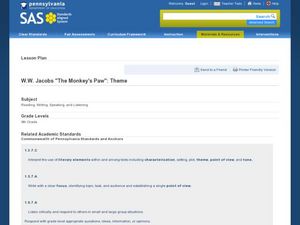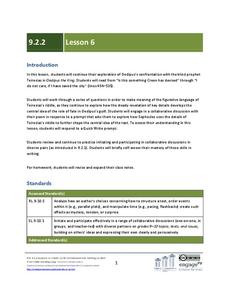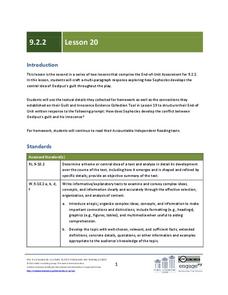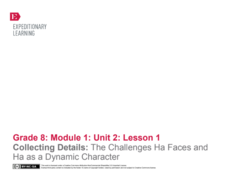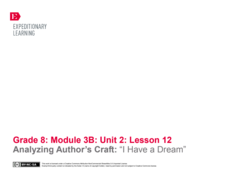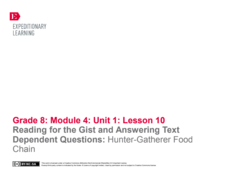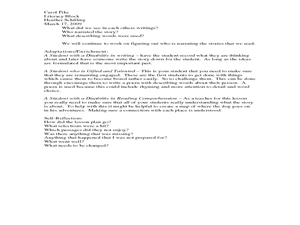Curated OER
The Chocolate Touch
Students read a book. In this story elements lesson, students share their favorite food, predict what the story will be about and discuss how they would feel if they got to eat their favorite food everyday. Students read the book The...
Prestwick House
Analyzing Multiple Interpretations of Literature
There is a reason why an Oscar is given each year for the Best Adaptation Screenplay. Adaptations are the focus of an exercise that asks class members to compare a work of literature with a least one adaptation of the work into a...
EngageNY
Introducing Module 4B: “Water Is Life”
Learners take a gallery walk around the classroom to view various images and quotes. As they walk, they write down what they notice and wonder about what they see. After discussing their notice and wonder notes, they read the...
Curated OER
Poetry As Oral Performance
Reciting poetry is a great way to build oral language skills and build classroom community. Pupils look at the text elements of poetry and choose a poem to read aloud. They focus on rhythm, fluency, and expression. This is a great way to...
Curated OER
Why Thank You!
Fifth graders listen to a read aloud of Patricia Polacco's, Thank You, Mr. Falker! students examine the use of voice in the book, discuss the writing and theme ideas. They write a thank you not to their hero.
Curated OER
Reading the Movies: Another Approach To Teaching Critical Thinking Skills And Writing
Young scholars explore the elements of film to analyze character, action, and the themes in the movie, "Quiz Show." The instructional activity encourages students to make personal connections and real life applications as they view the...
Curated OER
Where the Red Ferns
Where the Red Fern Grows provides the text for a study of the literary elements of plot, character, and setting. Discussion questions and vocabulary lists are referenced but not included.
Curated OER
W.W. Jacob's "The Monkey's Paw" Theme
Students identify the theme of "The Monkey's Paw" and relate it to prior knowledge. In this "The Monkey's Paw" lesson, students discuss fate and coincidence and debate which one controls destiny. A test is chosen as the winner based on...
EngageNY
Four Corners: Taking a Stand in To Kill a Mockingbird (Chapters 24-26 Plus Synthesis of Scenes in Previous Chapters)
Think outside the box! Scholars work on the Frayer Model, completing boxes for the word integrity. They turn and talk with partners to discuss real-life examples and some from To Kill A Mockingbird. Readers then discuss integrity, taking...
EngageNY
Grade 9 ELA Module 2, Unit 2, Lesson 3
The manipulation of time is one of the most essential elements in Sophocles' Oedipus the King. As your language arts class participates in a jigsaw discussion activity, they work together to analyze the play's plot structure and...
EngageNY
Grade 9 ELA Module 2, Unit 2, Lesson 6
The battle of wits and wisdom rages in Sophocles' Oedipus the King, particularly in Oedipus' discussion with Teiresias about the Sphinx's riddle. Ninth graders focus on this crucial conversation with a literary analysis instructional...
EngageNY
Grade 9 ELA Module 2, Unit 2, Lesson 10
The slow curse of realization begins to sink in during the tenth lesson in a literary analysis unit on Sophocles' Oedipus the King. Ninth graders carefully read the selected lines for evidence of Oedipus' feelings during a turning point...
EngageNY
Grade 9 ELA Module 2, Unit 2, Lesson 16
Was Oedipus' destiny determined by fate or by his actions? Using details from the text, ninth graders delve into a critical thinking exercise based on Sophocles' Oedipus the King. Now that Oedipus has learned his true identity, readers...
EngageNY
Grade 9 ELA Module 2, Unit 2, Lesson 20
Oedipus' lack of literal and figurative vision does not mean he cannot see his guilt in the terrible fates of Laius, Jocasta, and all the lives touched by prophecy. Conclude a literary analysis unit on Sophocles' Oedipus the King with a...
EngageNY
Collecting Details: The Challenges Ha Faces and Ha as a Dynamic Character
What is a dynamic character? Using an interesting resource, scholars set out to answer the question. They create graphic organizers to collect details about character development as they read the novel Inside Out & Back Again. They...
EngageNY
Close Reading: Paragraph 4 of “Refugee and Immigrant Children: A Comparison”
Why is reading a text closely a helpful skill? Using the 13th of 20 lessons from the Grade 8 ELA Module 1, Unit 2 series, scholars continue reading the informational text "Refugee and Immigrant Children: A Comparison." They work with...
EngageNY
Introducing Final Performance Task and Analyzing Statistics
How do statistics help people understand the universal refugee experience? Using the resource, scholars engage in an activity called a Chalk Talk, working in teams to analyze statistics from informational texts about refugees. Also, they...
EngageNY
Performance Task: Readers Theater Performance
It's show time! Scholars finalize their learning by performing their Reader's Theater script of To Kill A Mockingbird. As groups of actors perform, the remaining pupils give feedback using a rubric. After all groups finish, each person...
EngageNY
Launching The Performance Task: Building Background Knowledge: “War in the Pacific,” Part 1
It's all about a bit of give and take. Scholars silently read War in the Pacific and circle any unfamiliar words. Using context clues, they write each word on a strip of paper along with the inferred definition. After looking the word up...
EngageNY
Analyzing Author’s Craft: “I Have a Dream”
It's time to make some connections! Scholars complete a close reading of the speech I Have a Dream by Martin Luther King, Jr. They use an I Have a Dream Speech Gist Note-catcher, and I Have a Dream text-dependent questions to guide their...
EngageNY
Analyzing an Author’s Craft: Carlotta’s Journey to Justice
Find your voice. Readers look at a passage from A Mighty Long Way and discuss what it means for Carlotta to find her voice. After discussing figurative language and idioms, learners listen to the song "This Little Light of Mine" and...
EngageNY
Reading for the Gist and Answering Text Dependent Questions: Hunter-Gatherer Food Chain
Readers use sticky notes and a close reading guide to identify the gist of "My Pig" on pages 240–245 of The Omnivore's Dilemma. After reviewing their thoughts with peers, they answer text-dependent questions about the section.
EngageNY
Reflecting on Douglass’s Narrative
The conclusion of Narrative of the Life of Frederick Douglass comes to life in a reader's theater. The class discusses the use of quotation marks in the text and then divides parts among the groups. After the performances, groups...
Curated OER
Describing Our Senator
Third graders find the narrator or speaker in a story. In this story elements lesson, 3rd graders listen to the story My Senator and Me and answer comprehension questions. They complete a descriptive writing piece from different points...









